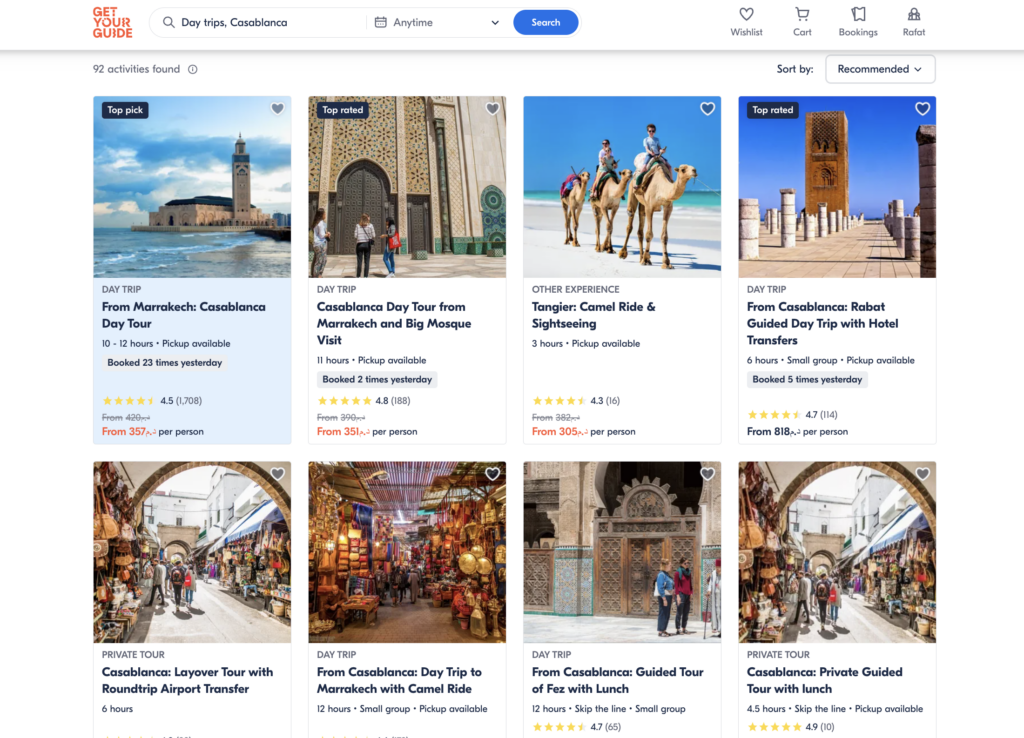
In this fast-dawning age of AI answers as the default construct for what we are searching for, the traditional listings paradigm that has dominated online travel booking for decades is facing an existential crisis. We may be at an inflection point where the very nature of how we discover and book experiences is being fundamentally reimagined. The days of endless scrolling through similar listings may soon be behind us and here’s why, I argue below.
This early shift is most evident in the tours and activities sector, what the industry now calls Experiences sector, where the limitations of list-based discovery are becoming increasingly apparent as AI-driven personalized recommendations seems to be the most obvious superior alternative.
The current listings-based approach, exemplified by these platforms like GetYourGuide, Viator, and Klook, suffers from several critical weaknesses. For example, when a traveler searches for “day trips from Casablanca,” they’re confronted with an overwhelming array of seemingly identical options, as I was in my recent extended stay in Morocco. Each listing, while potentially vetted by the platform, exists in a sort of contextual vacuum. The primary quality differentiator becomes user reviews – a metric that, while valuable, is increasingly insufficient as a standalone decision-making tool. And this when AI can generate and manipulate content, photos and even reviews, despite the checks and balances of these platforms.
This abundance of choice, paradoxically, makes decision-making more difficult rather than easier. When multiple providers offer nearly identical desert excursions or city tours, the subtle differences that makes the experience perfect for a particular traveler get lost in the noise. The platform model, which prioritizes quantity and comprehensiveness, inadvertently creates a sea of sameness where meaningful differentiation becomes nearly impossible. For many travelers, the real question is not “which of these 20 nearly identical tours is best?” Instead, it is “what is the best experience I can have, given my personal tastes, travel style, and schedule?”
The AI-Driven Alternatives & How This May Play Out
Consider the emerging alternative driven by mainstream tools like ChatGPT, Gemini, Claude and others: AI-powered discovery systems represent a fundamental shift from listing to understanding. The era of 10-blue-links — ok maybe with pictures and reviews — is over in regular search, and so it will be in travel. Instead of presenting users with an exhaustive catalog of options, these systems should be able to:
- Factor in a user’s previous travel history, preferences, and booking patterns
- Understand the contextual relevance of each experience
- Consider seasonal factors, local events, and real-time availability
- Present a curated selection of highly relevant options with clear explanations of why each recommendation matches the user’s needs
This approach transforms the discovery process from a passive scroll through listings to an active dialogue where the system understands and responds to the specific needs and desires of each traveler. The key difference is that AI systems can synthesize multiple data points and will then create a coherent narrative about why a particular experience would be meaningful for a specific traveler.
This transformation is likely to cascade through different segments of the travel industry at varying speeds. The experiences sector, with its relatively straightforward booking requirements and emphasis on experiential matching, will likely be the first to fully embrace AI-driven discovery. The AI then provides a single or small handful of top-tier choices, curated just for your profile, effectively removing the need to sift through a list at all.
Knowing these providers well, I know they are all working on AI tools internally and have launched some experiments externally and are very likely aware of the existential threat to the traditional listings paradigm. While the pace and outcomes of these efforts remain to be seen, I expect significant changes—or at least bigger experiments—on how these platforms adapt and present the listings in 2025 and beyond.
The shift will also reshape how we shop for hotels, even if slower. However, hotels can at least differentiate themselves through unique design, location, or brand identity. The problem: even with these differentiators, we still tend to open multiple tabs, read reviews, check star ratings (anyone??), or see how close the hotel is to where we need to be. So while the listing approach might stick around for a bit longer, the competitive advantage will lean heavily toward AI-driven answers.
An AI engine can factor in user loyalty program statuses, brand preferences, past booking patterns, and even intangible tastes (boutique-style hotels with a poolside bar, for instance). Rather than sorting through pages of accommodation listings, travelers will increasingly rely on AI’s direct recommendations. The end result? A curated list or single booking suggestion that feels — and is — tailor-made. The appeal of convenience and personalization will overshadow the old system of scrolling through panels of standard hotel listings.
The airline sector presents a more complex challenge. The intricacies of routing, connecting flights, alliance partnerships, and real-time pricing create a multidimensional puzzle that still benefits from the systematic nature of listings. Travelers, especially frequent flyers, often enjoy comparing different carriers’ schedules and prices. We’re likely to see a hybrid model emerge, where AI assists in narrowing down options and understanding preferences, but the final selection still relies on traditional listing formats to handle the complexity of flight combinations.
This shift from search to dialogue represents a fundamental change in how we interact with travel information and make booking decisions. The implications extend beyond just convenience. This transformation promises to bring tons of innovation in experience design and delivery, which I am excited about. Also it will reduce decision fatigue by presenting fewer but more relevant options, and in the end support better price discovery and coming up with new ways and indicators of value assessment along the way.
Marketplaces that fail to integrate smart, AI-driven tools will find themselves outpaced by those that can simulate or surpass — or even incorporate — the best human travel agent’s recommendations. After all, it’s about crafting better, more human journeys for travelers. Wouldn’t that be the ultimate win for humanity?


